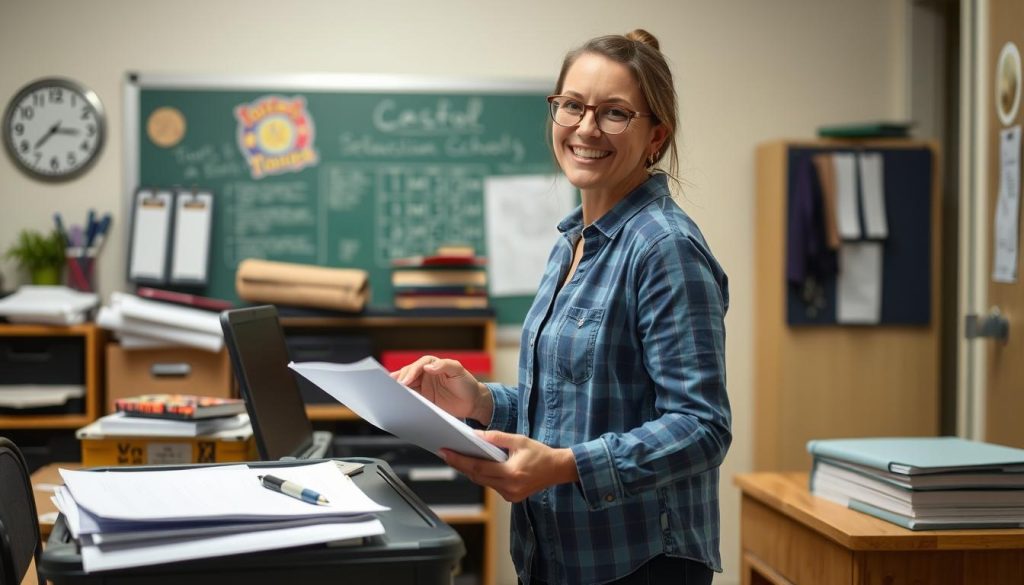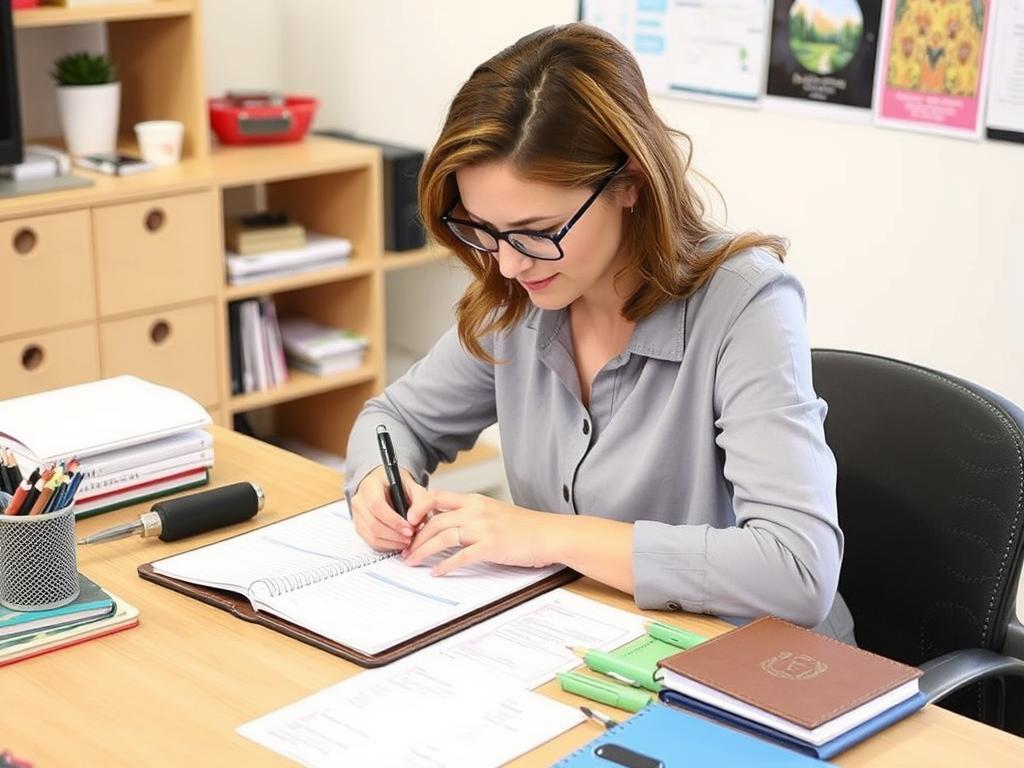Why Self-Care Strategies Are Essential for Teachers
Teaching is consistently ranked among the most stressful professions. According to a 2021 RAND Corporation study, nearly one in four teachers reported experiencing symptoms of depression, with stress levels comparable to healthcare workers. The emotional labor of teaching—managing classroom dynamics, supporting struggling students, and meeting ever-increasing expectations—takes a significant toll.
Implementing self-care strategies isn’t selfish—it’s necessary for sustainability in your teaching career. When you prioritize your wellbeing, you’re actually enhancing your teacher skills by ensuring you have the emotional and physical resources to be fully present for your students. Self-care strategies help you manage stress, prevent burnout, and maintain the enthusiasm that drew you to teaching in the first place.
Did you know? Teachers who regularly practice self-care strategies report higher job satisfaction, better classroom management skills, and more positive relationships with students.
The benefits of consistent self-care strategies extend beyond your personal wellbeing to directly impact your effectiveness in the classroom. When you’re well-rested and emotionally balanced, your teacher skills naturally improve—you become more patient with challenging behaviors, more creative in your lesson planning, and more resilient when facing obstacles.
Enhance Your Teacher Skills Through Self-Care
Discover specialized resources designed to help K12 teachers implement effective self-care strategies into their busy schedules.
Mindfulness Self-Care Strategies for Classroom Balance
Mindfulness—the practice of bringing your attention to the present moment—is one of the most accessible and effective self-care strategies for teachers. In the midst of a hectic school day, mindfulness techniques can help you reset, refocus, and respond rather than react to challenging situations.

Quick Mindfulness Practices for Busy Teachers
1. Three-Minute Breathing Space
Between classes or during prep periods, take three minutes to practice this simple technique:
- Minute 1: Acknowledge your thoughts and feelings without judgment
- Minute 2: Focus solely on your breath
- Minute 3: Expand awareness to your whole body
This brief mindfulness practice can reset your nervous system and enhance your teacher skills by improving your emotional regulation before interacting with students.
2. Mindful Transitions
Use the transitions between classes or activities as mindfulness opportunities:
- Take three conscious breaths before greeting your next class
- Feel your feet on the floor while students are changing activities
- Notice three things you can see, hear, and feel to ground yourself
These micro-practices strengthen your teacher skills by helping you maintain presence throughout the day.
Incorporating mindfulness into your teaching routine doesn’t require extensive training or time commitments. Even brief moments of mindful awareness can significantly reduce stress and enhance your teacher skills. Many educators find that mindfulness self-care strategies help them respond more effectively to classroom challenges and maintain emotional balance throughout the day.
“Mindfulness has transformed my teaching experience. Taking just a few minutes for myself between classes helps me reset and be fully present for my students. It’s become an essential teacher skill in my daily practice.”
— Maria L., 4th Grade Teacher
For a deeper exploration of mindfulness self-care strategies specifically designed for educators, Credits for Teachers offers specialized resources that can be implemented within your busy schedule.
Physical Self-Care Strategies to Sustain Your Teaching Energy
The physical demands of teaching are often overlooked. From standing for hours to managing the physical space of a classroom, teaching is as physically taxing as it is mentally challenging. Physical self-care strategies are essential for maintaining the energy and stamina needed to effectively utilize your teacher skills throughout the school year.

Movement Strategies for Teachers
Finding time for physical activity might seem impossible with your teaching schedule, but incorporating movement throughout your day can significantly impact your wellbeing and teacher skills. Consider these practical approaches:
- Classroom Movement Breaks: Join your students during brain breaks—simple stretches or quick movement activities benefit you as much as your students
- Teacher-Friendly Workouts: Short, high-intensity workouts (10-15 minutes) before or after school can boost energy and mood
- Walking Meetings: Suggest walking during parent conferences or colleague discussions when appropriate
- Desk Stretches: Incorporate simple stretches during prep periods to release tension
Nutrition and Hydration for Sustained Energy
Your eating and drinking habits significantly impact your energy levels and teacher skills throughout the day. Consider these practical nutrition self-care strategies:
Meal Prep Strategies:
- Prepare grab-and-go breakfast options for busy mornings
- Pack nutrient-dense lunches that won’t leave you with an afternoon energy crash
- Keep healthy snacks in your desk for between-class energy boosts
Hydration Habits:
- Keep a water bottle at your desk and set reminders to drink
- Infuse water with fruit for flavor if plain water is unappealing
- Be mindful of caffeine intake, especially in the afternoon
Physical self-care strategies directly enhance your teacher skills by ensuring you have the energy and physical wellbeing to engage fully with your students. When you’re physically well, you’re better equipped to handle the demands of the classroom and model healthy habits for your students.
Boost Your Energy and Teacher Skills
Access our specialized physical self-care program designed specifically for the unique needs of K12 teachers.
Boundary-Setting Self-Care Strategies for Work-Life Balance
Perhaps the most challenging aspect of teaching is knowing where to draw the line between your professional and personal life. Setting healthy boundaries is a crucial self-care strategy and an essential teacher skill that protects your wellbeing while actually improving your effectiveness in the classroom.

Creating Time Boundaries
Time boundaries are especially challenging for teachers, as there’s always more work that could be done. Implementing these self-care strategies can help you reclaim your personal time while still being an effective educator:
- Set a departure time: Decide when you’ll leave school each day and honor that commitment to yourself
- Establish grading blocks: Designate specific times for grading rather than letting it consume evenings and weekends
- Create a “no work” zone: Designate certain spaces in your home or times in your week that are completely work-free
- Use technology intentionally: Set specific times to check email rather than being constantly available
“Learning to leave work at work was the most important self-care strategy I’ve implemented in my 15 years of teaching. It not only saved my mental health but actually made me a better teacher because I came to school refreshed and fully present.”
— James T., High School English Teacher
Communication Boundaries
Clear communication boundaries are essential self-care strategies that protect your time and energy while modeling professional teacher skills:
With Parents:
- Communicate your preferred contact methods and response timeframes
- Set clear expectations about when you’re available for communication
- Create templates for common communications to save time
With Colleagues and Administration:
- Learn to say “no” to additional commitments when your plate is full
- Suggest alternatives when you can’t take on new responsibilities
- Be clear about your capacity and limitations
Setting boundaries isn’t selfish—it’s a necessary self-care strategy that preserves your energy for what matters most. By establishing clear boundaries, you’re actually enhancing your teacher skills by ensuring you have the emotional and mental resources to be fully present and effective in the classroom.
For more guidance on implementing boundary-setting self-care strategies in your teaching practice, explore the resources available at Credits for Teachers.
Emotional Self-Care Strategies to Sustain Your Teaching Passion
Teaching is emotionally demanding work. From managing classroom dynamics to supporting students through their challenges, teachers experience a range of emotions throughout each day. Emotional self-care strategies are essential for processing these experiences and maintaining the emotional resilience that’s a core teacher skill.

Reflection Practices for Emotional Processing
Regular reflection helps you process the emotional aspects of teaching and enhances your teacher skills by providing insights into your practice:
- End-of-day reflection: Take 5 minutes before leaving school to note what went well and what was challenging
- Gratitude practice: Record three positive moments from your teaching day
- Journaling: Use writing to process difficult interactions or celebrate successes
- Visualization: Mentally rehearse positive outcomes for challenging situations
Building Emotional Support Networks
No teacher should navigate the emotional challenges of education alone. Creating support networks is a crucial self-care strategy that enhances your teacher skills through collaboration and shared experience:
Professional Support:
- Find a mentor or become one for another teacher
- Join or create a teacher support group at your school
- Participate in professional learning communities focused on teacher wellbeing
Personal Support:
- Nurture friendships outside of education
- Consider working with a therapist or counselor
- Connect with family members who understand the demands of teaching
Teacher Tip: Create a “celebration folder” where you save positive notes from students, parents, or colleagues. On difficult days, reviewing these reminders of your impact can be a powerful emotional self-care strategy.
Emotional self-care strategies are not just about managing difficult feelings—they’re about cultivating joy and satisfaction in your teaching practice. By attending to your emotional wellbeing, you’re strengthening essential teacher skills like empathy, patience, and resilience.
Strengthen Your Self-Care
Access specialized emotional self-care resources designed specifically for K12 teachers.
Cognitive Self-Care Strategies to Enhance Teacher Skills
Teaching requires significant cognitive resources—from lesson planning to quick decision-making in the classroom. Cognitive self-care strategies help you maintain mental clarity and enhance your teacher skills by protecting your most valuable resource: your mind.

Mental Refreshment Techniques
Just as your students need brain breaks, you need mental refreshment to maintain cognitive function and enhance your teacher skills:
- Task switching: Alternate between different types of teaching tasks to prevent mental fatigue
- Nature breaks: Even brief exposure to natural environments can restore mental focus
- Creative pursuits: Engage in non-teaching creative activities to stimulate different parts of your brain
- Learning something new: Become a student again by learning a skill unrelated to teaching
Cognitive Load Management
Teachers juggle countless mental tasks throughout the day. These strategies help manage cognitive load and preserve mental energy:
Organization Systems:
- Use digital or physical planners to externalize your mental to-do list
- Create templates for recurring tasks like lesson plans or parent communications
- Implement filing systems that reduce time spent searching for materials
Decision Fatigue Reduction:
- Batch similar tasks to reduce context switching
- Simplify routine decisions (like what to wear or eat) to preserve mental energy
- Schedule important decisions for times when your mental energy is highest
Cognitive self-care strategies directly enhance your teacher skills by ensuring your mind is sharp and focused when you need it most. By protecting your mental resources, you’ll find yourself more creative in your teaching approaches and more effective in your classroom management.
“I used to pride myself on multitasking, but implementing cognitive self-care strategies taught me that focusing on one thing at a time actually makes me a more effective teacher. My lesson planning is more creative, and I’m more present with my students.”
— Sophia R., Middle School Science Teacher
For more strategies to enhance your cognitive wellbeing and teacher skills, explore the resources available at Credits for Teachers.
Time-Efficient Self-Care Strategies for Busy Teachers
One of the biggest barriers to implementing self-care strategies is the perception that they require significant time—something teachers have precious little of. However, effective self-care doesn’t always require large time commitments. These time-efficient self-care strategies can be integrated into even the busiest teaching schedule.

Micro Self-Care Practices
These brief self-care strategies take less than five minutes but can significantly impact your wellbeing and teacher skills:
1-Minute Practices:
- Three deep breaths before greeting a new class
- Shoulder rolls and neck stretches between lessons
- Splash cold water on your face during a bathroom break
3-Minute Practices:
- Quick mindfulness meditation during lunch
- Text a supportive friend or family member
- Step outside for fresh air between classes
5-Minute Practices:
- Journal three things that went well today
- Listen to an uplifting song during prep period
- Do a quick set of desk exercises
Integrating Self-Care Into Teaching Activities
Some of the most effective self-care strategies for teachers can be implemented right alongside your teaching activities, enhancing both your wellbeing and your teacher skills:
- Teach what you love: When possible, incorporate your personal interests into your curriculum
- Move with your students: Join in during physical activities rather than just supervising
- Practice mindfulness together: Lead brief mindfulness exercises that benefit both you and your students
- Create beauty: Make your classroom a visually pleasing environment that nurtures your spirit as well as your students’
Remember: Even small self-care actions accumulate over time. Consistent micro-practices often have a greater impact than occasional larger self-care activities.
By implementing these time-efficient self-care strategies, you’re not only protecting your wellbeing but also modeling important life skills for your students. When they see you prioritizing self-care, they learn that self-respect and personal boundaries are valuable teacher skills worth developing.
For more time-efficient self-care strategies specifically designed for busy teachers, visit Credits for Teachers’ Self-Care Resources.
Seasonal Self-Care Strategies Throughout the School Year
The teaching year has natural rhythms and challenges that vary from season to season. Adapting your self-care strategies to address the specific demands of each part of the school year can help you maintain your wellbeing and teacher skills throughout the entire academic calendar.

Back-to-School Season Self-Care
The beginning of the school year brings excitement but also significant stress as you establish routines and get to know new students. These self-care strategies can help you navigate this demanding time:
- Preparation boundaries: Set specific times for back-to-school prep and honor your off-hours
- Sleep prioritization: Gradually adjust your sleep schedule before school starts
- Systems creation: Invest time in creating organizational systems that will save time throughout the year
- Connection rituals: Establish regular check-ins with supportive colleagues from the start
Mid-Year Maintenance Self-Care
The middle of the school year often brings fatigue and the need to sustain momentum. These self-care strategies can help you maintain your energy and teacher skills:
Energy Management:
- Reassess and adjust your workload if necessary
- Incorporate more movement into your daily routine
- Be intentional about celebrating small victories
Refreshment Practices:
- Try new teaching approaches to prevent stagnation
- Schedule a personal day if possible
- Revisit and refresh your classroom environment
End-of-Year Self-Care Strategies
The end of the school year brings closure activities, assessments, and often emotional transitions. These self-care strategies can help you finish strong:
- Reflection practices: Take time to acknowledge your growth and successes
- Celebration rituals: Create meaningful ways to celebrate the year with students and colleagues
- Transition planning: Develop a clear plan for wrapping up the year and transitioning to summer
- Renewal focus: Begin planning how you’ll use summer for both rest and professional growth
“Learning to adapt my self-care strategies to the rhythm of the school year has been transformative. I now anticipate challenging periods and proactively adjust my self-care practices, which has made me a more consistent and effective teacher throughout the entire year.”
— Michael D., Elementary School Teacher
By tailoring your self-care strategies to the specific demands of each part of the school year, you can maintain your wellbeing and teacher skills even during the most challenging periods. This seasonal approach to self-care acknowledges the changing nature of your work and helps you respond proactively to each phase of the academic calendar.
Explore Teacher Self-Care Course
Access seasonal self-care resources designed to support you through every phase of the school year.
Community-Based Self-Care Strategies for Teacher Support
While many self-care strategies focus on individual practices, community-based approaches can be equally powerful. Teaching can be isolating, and connecting with others who understand your experiences is an essential self-care strategy that enhances both your wellbeing and your teacher skills.

Building Supportive Teacher Communities
Creating intentional connections with other educators can provide emotional support, practical resources, and opportunities to enhance your teacher skills:
- Peer mentoring: Establish a relationship with a trusted colleague for regular check-ins and support
- Professional learning communities: Join or create groups focused on teacher wellbeing alongside professional development
- Cross-grade collaborations: Connect with teachers from different grade levels to gain fresh perspectives
- Virtual teacher networks: Engage with online communities that understand the unique challenges of teaching
Collaborative Self-Care Activities
Some self-care strategies are more effective when practiced with others. Consider these community-based approaches:
In-School Activities:
- Organize teacher walking groups during lunch or after school
- Create a teacher relaxation space in your building
- Establish regular celebration rituals for teacher accomplishments
Beyond-School Connections:
- Schedule regular social gatherings with colleagues
- Form or join teacher book clubs or hobby groups
- Participate in teacher wellness retreats or workshops
Teacher Tip: Start small with community-building efforts. Even connecting with just one supportive colleague can significantly enhance your teaching experience and provide valuable emotional support.
Community-based self-care strategies not only support your wellbeing but also enhance your teacher skills through collaboration and shared wisdom. When teachers support each other, the entire school community benefits from increased resilience, creativity, and professional satisfaction.
For resources on building supportive teacher communities and implementing community-based self-care strategies, visit Credits for Teachers.
Creating Your Personalized Self-Care Strategy Plan
The most effective self-care strategies are those tailored to your specific needs, preferences, and teaching context. Creating a personalized self-care plan helps you prioritize practices that will most effectively support your wellbeing and enhance your teacher skills.

Self-Assessment: Understanding Your Needs
Begin by assessing your current wellbeing and identifying areas that need attention:
Physical Wellbeing Assessment
Ask yourself:
- How is my energy level throughout the teaching day?
- Am I experiencing physical symptoms of stress (headaches, tension, etc.)?
- Are my basic needs (sleep, nutrition, movement) being met?
- What physical self-care strategies would most support my teaching practice?
Emotional Wellbeing Assessment
Consider:
- What emotions do I frequently experience during teaching?
- Do I have effective ways to process challenging emotions?
- Am I experiencing joy and satisfaction in my teaching?
- What emotional self-care strategies would enhance my teacher skills?
Professional Wellbeing Assessment
Reflect on:
- Do I feel effective and competent in my teaching?
- Am I continuing to grow and develop my teacher skills?
- Do I have appropriate boundaries between work and personal life?
- What professional self-care strategies would support my growth?
Designing Your Personal Self-Care Strategy Plan
Based on your self-assessment, create a personalized plan that addresses your specific needs:
- Identify your non-negotiable self-care strategies – These are the foundational practices that you commit to maintaining even during the busiest times
- Schedule regular self-care check-ins – Set specific times to assess how you’re doing and adjust your strategies as needed
- Create a menu of self-care options – Develop a list of practices for different situations and time constraints
- Establish accountability – Share your self-care goals with a trusted colleague or friend who can support your commitment
- Celebrate your self-care successes – Acknowledge when you successfully prioritize your wellbeing
“The most important thing I’ve learned about teacher self-care is that it’s not one-size-fits-all. Taking the time to develop a personalized plan that addresses my specific challenges has made all the difference in sustaining my passion for teaching.”
— Elena K., High School Math Teacher
Remember that your self-care needs will evolve throughout your teaching career. Regularly revisiting and refining your self-care strategies ensures they continue to effectively support your wellbeing and enhance your teacher skills.
Master the Art of Self-Care
Access our guided self-assessment tools and personalized planning resources designed specifically for K12 teachers.
Embracing Self-Care as an Essential Teacher Skill
Throughout this guide, we’ve explored a wide range of self-care strategies designed specifically for K12 teachers. From mindfulness practices to boundary-setting, from physical wellbeing to community support, these strategies are not luxuries but essential components of sustainable and effective teaching.
Self-care isn’t selfish—it’s a fundamental teacher skill that enables you to bring your best self to your classroom each day. By prioritizing your wellbeing, you’re not only protecting yourself from burnout but also modeling healthy behaviors for your students and enhancing your effectiveness as an educator.
Remember that implementing self-care strategies is an ongoing journey, not a destination. Start small, be consistent, and adjust your approaches as your needs change throughout your teaching career. Even small steps toward better self-care can yield significant benefits for your wellbeing and your teaching practice.
As you continue developing your teacher skills, make self-care a non-negotiable part of your professional identity. Your students, your colleagues, and your future self will thank you for the investment you’re making in your wellbeing today.
Continue Your Self-Care Journey
Access comprehensive resources designed to support K12 teachers in implementing effective self-care strategies throughout their careers.




